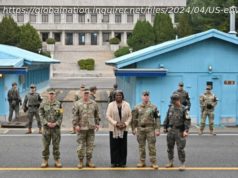The foreign policy establishment was relieved at the sudden end to the North Korean summit. But Koreans hoping for peace were crushed.
Outside the North Korean Embassy in Hanoi, a glass case displaying an array of patriotic photographs was reportedly reorganized just before Kim Jong-un’s arrival. The chairman’s portrait remained untouched at the top of the vitrine, but the images of fruit orchards and fishing boats had been swapped out for those of factories and a satellite antenna. A South Korean reporter, standing outside the embassy, observed that the new pictures seemed “tailored to fit a theme of Vietnamese-style reform and opening.”
Instead, President Trump and Mr. Kim cut short their parley, ending the summit on Thursday with no agreement in hand. Much of the American foreign policy establishment, including Democratic legislators, reacted with smug surprise. Mr. Trump had been played, they said, but he was right to walk away rather than to promise too much. According to the president, North Korea had demanded a lifting of all sanctions, to which Washington could not agree. A North Korean official said Pyongyang asked for only “partial” sanctions relief. Washington’s North Korea watchers and foreign policy experts — what Ben Rhodes, President Barack Obama’s deputy national security adviser, has called the Blob — concluded that the summit was a failure and that Mr. Trump never should have met with Mr. Kim in the first place. The Blob was content.
Many South Koreans, however, felt dismayed. Mr. Trump is no model statesman, and his record as president has largely been reckless and cruel. Yet in the Korean context, his bucking of foreign policy tradition (born, undoubtedly, of a quest for personal glory) has at least drawn the North into the global arena.
Seoul has never had the luxury of selective dealings with Pyongyang. North Korea’s nuclear stockpiles are a less immediate threat than the mass of conventional arms lining the Demilitarized Zone, just across the border. For South Korea, sanctions against the North are not simply a virtue-signaling device, but a policy with immediate, real-world consequences: They can spur the flow of refugees out of the North, undermine efforts by the South to send food and other humanitarian assistance, and make it difficult to host inter-Korean family reunions. The pursuit of a peace treaty — to replace the 1953 armistice, to which the United States but not South Korea was a signatory — would, beyond its symbolic value, help dismantle the culture of militarism and anti-Communist paranoia that has, at times, justified repressive crackdowns in the South.






